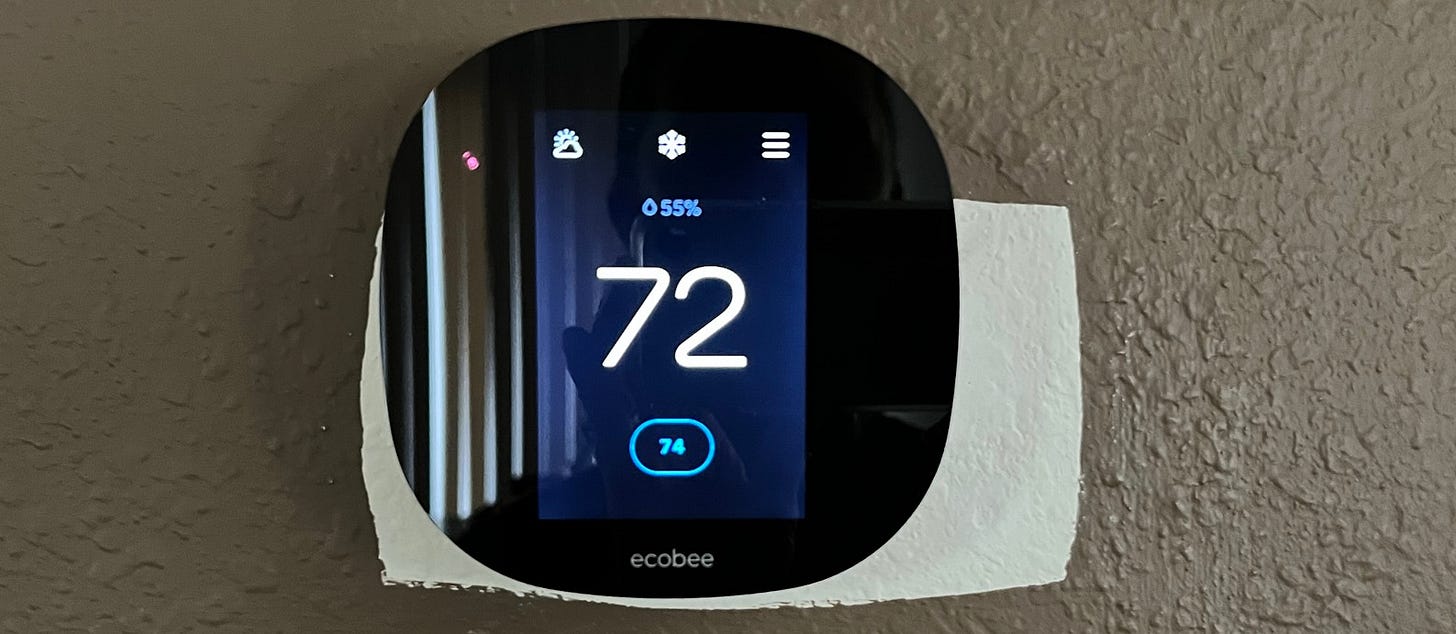Dear family, friends, and Internet strangers,
I’ve noticed a pattern in the way some people talk about humans, like we can be broken apart, rearranged, or even have components replaced like so much furniture.
There are people who would boil humanity down to conscious thought or symbolic reasoning alone, as if we are computers in meat machines, as if the bodies we’re born into are irrelevant except as brain vehicles.
I have observed, and participated in, attempts to treat logic and emotion as warring factions—the ideology behind the Vulcan species in the Star Trek franchise.
There are people who think the body is all we are; the mind is the brain (and whatever your gut bacteria are apparently telling you), the brain is the body.
I read an article in the June 2023 issue of Wired that seems to take this piecemealing to its logical conclusion (Paul Ford, “The Great Compression”, Wired, June 2023). The author writes like his recently deceased father is—is—now only his left-behind writings, belongings, and ashes, ultimately “zipped” into one digital file, one box of objects, and one urn in the ground. An entire human, compressed into atoms and bits.
The same issue of that magazine contains an article responding to the question of whether AI has a subconscious, and the author attempted to bring Jungian divisions of the mind to bear on the subject: Meghan O’Gieblyn, “Does AI Have a Subconscious?”, Wired, June 2023
In the course of attempting to answer that question, she wrote this:
“If symbolic logic is rooted in the Enlightenment notion that humans are ruled by reason, then deep learning—a thoughtless process of pattern recognition that depends on enormous training corpora—feels more in tune with modern psychology’s insights into the associative, irrational, and latent motivations that often drive our behavior.”
I had bought into this “Enlightenment notion” without noticing; I’d essentially plateaued in my piano playing because I thought, for some reason, that relying on implicit memory instead of explicit memory meant it “didn’t count”, I guess?
Less to deal with that issue and more to address performance anxiety, my piano teacher suggested I read The Inner Game of Tennis by W. Timothy Gallwey, in which the author divides humans into the language-reasoning self (Self 1) and the self that lets you walk without thinking about what your legs are doing (Self 2). It talks about how to get Self 1 out of the way so you can play tennis in a natural way. The short answer is calm focus, putting all of your attention on playing, and none on judging your playing.
This applies to piano, and pretty much anything else. Around the same time, I observed this phenomenon when bouldering at a climbing gym. I noticed that in some situations, if I stopped thinking so hard, my body simply found its own way up the wall.
I finished the book; my piano playing has notably improved. Perhaps the book is “more in tune with modern psychology” in its focus on the non-conscious mind. It is unexpectedly Buddhist in its philosophy, and I don’t agree with much of what he says on that side of the issue. But the practical takeaways are real: it is possible to let implicit memory, muscle memory, some human form of memory beyond the conscious, do the work.
The problem, then, was that I’d thought of humans, or the thing that makes us human, as, essentially, reason, or conscious thought—the aforementioned “Enlightenment notion”. I live in modern America, and this is part of the air here.

So I plummeted into the crevasse that is the question, “What is a human?”
Since then, I’ve been catching glimpses of that question everywhere, an ongoing and widespread search for an ontology of humanity—an answer to “what is a human?” An ongoing attempt to capture, describe, divide, examine, explain a human in a comprehensive, satisfactory way.
I don’t think people necessarily realize they’re doing it. That Wired issue picked up pieces of humanity and made declarations about those pieces. The Inner Game of Tennis makes declarations about aspects of humans and how to learn to reign over them.
The seemingly overnight infiltration of AI into deeply human aspects of our world is further driving this conversation. What we believe about anything affects our actions, moods, and hope. If you believe humans are substantially the same as AI—brains that process information—are you capable of anything beyond resignation or despair in the face of AI’s advances?
But we are much more.
I sought answers for what “more” looks like. What is “soul” and where does muscle memory fit in with “mind” or “body”? Where does “body” end and the “flesh”, often defined as the carnal desires of humanity, begin?
The English words we tend to use for the “components” of a human include, but are surely not limited to, “mind”, “brain”, “heart”, “soul”, “spirit”, “body”, and, in the Christian tradition, “flesh”. Some people will refer to “implicit memory”, or maybe to the “lizard brain”, when trying to get more granular and refer specifically to the non-conscious mind.
I wanted to know what the Holy Bible contained on the topic. (If you’re reading this and not currently a Christian, aspects of the biblical perspective permeate our culture’s approach to discussing human persons, and are worth your time to examine anyway.)
I expected a wealth of wisdom from the centuries of thought, expressed in both Hebrew and Greek, within, and its many words for the disparate “parts” of a human. I was not disappointed.
The Book itself says this:
“And the Lord God formed man of the dust of the ground, and breathed into his nostrils the breath of life; and man became a living soul [nephesh].” -Genesis 2:7 (KJV; bracketed word added)
It is interesting that according to that Genesis passage, man became a “soul”, a “nephesh”, and did not only receive a soul (at least, what we translate into “soul”) in a separate-from-soul dust body.
At the same time, the Greek “psyche” (or psuché) is translated “soul” in passages like these (bracketed words added):
“And do not fear those who kill the body [soma] but cannot kill the soul [psyche]. Rather fear him who can destroy both soul [psyche] and body [soma] in hell.” -Matthew 10:28 (ESV)
“And he said to his disciples, ‘Therefore I tell you, do not be anxious about your life [psyche], what you will eat, nor about your body [soma], what you will put on.’ ” -Luke 12:22 (ESV)
“Soul” is not “body”, and to kill the “soma” is not necessarily to kill the “psyche” (used differently in ancient Greek than its modern English cognate). Yet “psyche” is tied, in the passage in Luke, to eating—it is life, not merely a separate consciousness from the soma.
“Soma”, body, is not the same as the “sarx”, the “flesh” referred to throughout the New Testament, which seems to refer generally to carnal human nature. “Sarx” is not always used in the context of evil; the topic of “sarx” is too much to get into thoroughly here.
Psyche, soma, and pneuma (“spirit”, a discussion of which is outside the scope of this letter) are listed as distinct from each other in this passage (bracketed words added):
“Now may the God of peace himself sanctify you completely, and may your whole spirit [pneuma] and soul [psyche] and body [soma] be kept blameless at the coming of our Lord Jesus Christ.” -1 Thessalonians 5:23 (ESV)
Every use of “psyche” in the New Testament adds information to a complex picture of what is meant by the “soul”, which at this moment I’m defining personally as “the whole enchilada”. The whole human person, including the body, while we are embodied, but continuing beyond the body after the flesh-body dies.
The older English use of “soul” to mean “life”, as in, “The ship went down with all souls”, seems more in keeping with this ancient use of the word than the way we use it now. The use of it now is almost indistinct from “spirit” at times, in some circles.
(I’ve also heard people assert that the “soul” is made of the “mind, will, and emotions”. I’ve heard this repeatedly. I have no clue what the basis for that assertion is, and haven’t found it with a cursory look online.)
My point is that the Imago Dei is not neatly divisible.
I happened upon a 62-page academic paper on the use of “mind”-related words in ancient Greek, specifically those that appear in the Illiad and the Odyssey, by psycholinguist Boban Dedović: “ ‘Minds’ in ‘Homer’: A quantitative psycholinguistic comparison of the Iliad and Odyssey […]”, University of Maryland, 18 January 2021
I found that in considering only psyche, soma, pneuma, and sarx, I have not gone nearly far enough into ancient Greek thought, which is different from ancient Hebrew thought or modern American thought. I also found that even for professional academics, what a “soul” is is confusing.
Of “psyche” in the Homeric literature, Dedović says, “Psykhe mainly functions with respect to the property of biological life, physiological separation from the corporal body, and the post mortem journey to—and existence in—Hades.”
Greek thought from ca. 900 BC is different from Greek thought in the first century AD (including the writings of the New Testament). The thoughts of Greek-speaking Jews were different from those of Greeks in the same era with little Jewish influence. Yet both the Homeric poems and the New Testament seem to refer to the “soul” in a complex way.
If we are made in the image of God, should we expect something small, or simple?
I asked our pastor some of my questions about the nature of humanity, and he gently suggested I check out Dallas Willard, a philosopher and author with a focus on Christian spiritual formation, and his description of what a human is. I was able to find Willard’s beliefs summarized in a paper by someone who evidently knew him personally, who wanted to edit, and to clarify, Willard’s approach: J. P. Moreland, “Tweaking Dallas Willard’s Ontology of the Human Person”, Journal of Spiritual Formation & Soul Care, Vol. 8, No. 2; 2015
I haven’t read Moreland’s own arguments (they are later in the paper and the rabbit hole I fell down by choosing this topic for July is unending), but the section on Dallas Willard’s ontology of a human was helpful. He, too, believed that we humans seem to be more than the physical, more than reason, and more, even, than the nonphysical soul in a container.
This is a lot, right?
I’ve run into this experience repeatedly in my search for information:
“My son, beware of anything beyond these. Of making many books there is no end, and much study is a weariness of the flesh.” -Ecclesiastes 12:12 (ESV)
And that experience in itself was enough of an answer until I decided to write this month’s letter on the topic: that we are more than reason, and my attempts to discover even this fraction of knowledge through only study and reason left my body, and my mind, exhausted.
I believe an ontology of humanity is important, and has specific applications in the age we’re in. I think an ontology of humanity is difficult and must cross cultures and eras to begin to accurately represent what it means to be a complete human person.
The many aspects of a human person are not disparate parts haphazardly attached to one another. There is overlap and influence. Mind and body, logic and feeling, and all other aspects of being human—these things affect one another and do not exist as discrete entities. They exist within, perhaps, the human nephesh, or psyche, or soul.
We do ourselves and our fellow humans a gross disservice to pretend we can simply pull ourselves apart into pieces, like a jointed doll, removing or replacing the parts we don’t like or don’t really understand.
I am more than reason, and more than implicit memory.
My logic isn’t “cold” on the one hand, or “all that makes me human” on the other; it’s one part of how I, a complete human being, understand and explain reality.
My emotions aren’t “weak” on the one hand, or my god on the other, to be served at any cost; they are one part of how I, an entire human being, understand reality.
My body isn’t “irrelevant” on the one hand, or “all a human is” on the other; it is part of what makes me an entire human. This body filled with the breath of life—from God—is my soul, my nephesh.
My corruptible body, my eternal spirit, both are how I exist as a redeemed human—though again, “spirit” is another discussion entirely.
Set your mind on the Spirit and not the flesh (cf. Romans 8:5-6); but don’t pretend we are only reason, only body, only feelings, only flesh. Can we stop trying to break humans into our constituent parts? We are more than the sum of these things.
If you’re reading this and you’re not currently a Christian, I wonder what this sounds like to you. I imagine you’ve noticed some of the things I have, and maybe your own answer to “what is a human?” doesn’t hold up under the scrutiny you’re giving it now. Maybe you see that we are more than AI in animal skin; maybe you want to understand the “Imago Dei”, the image of God, that we carry.
If you don’t know Christ and want to, or have some questions, you can reply to this email, email directly at rae (at) raebotsford.com, or reach out to a Christian you know.
If you’re not ready to reach out to someone, I suggest you start with John Piper’s message, “What Must I Believe to Be Saved?”
If you’ve recently decided to follow Jesus but are unsure what the next step is, I think I can recommend Dr. James Emery White’s book, After “I Believe”. I have not yet read it, but I’ve been following his blog for years and I find him to be solid, compassionate, a good communicator, and rather thorough about biblical truth.
If you don’t know how to find a church, you might start with online services at Mecklenburg Community Church (physically in Charlotte, NC), where Dr. White serves as senior pastor. They have a full online campus with services on Sundays and Tuesdays. You can begin there as you seek a good church where you reside.
Based on personal experience, I specifically suggest Indy Vineyard Church in Indianapolis, IN, or Lifepoint in Palm Bay, FL, if you’re local to one of those.
No local church is perfect; in my own experience, these three I’ve mentioned are good.
Writing Updates
I finished a rewrite draft of the second chapter in my novel, and I’ve continued my paid editing and this Substack.
Visual Arts - A dose of whimsy
I did a small art project this month. We recently upgraded our thermostat to an Ecobee, and since the previous homeowners had painted around the original thermostat, there was an ugly white rectangle-blob left behind:
I wanted to do something creative to cover it, so I painted these whimsical wildflowers:
I like how it turned out! If I change my mind later, maybe we’ll paint the whole wall something that isn’t brown 🙃
Book reviews under 15 words:
Twenty Thousand Leagues Under the Sea by Jules Verne: A worthy and fun adventure novel, punctuated annoyingly by laundry lists of marine life.
Victorious Eschatology by Harold R. Eberle and Martin Trench: A reasonable, accessible approach to partial-preterist theology, worth examining with an open mind.
A link I found useful/interesting:
“Why the Past 10 Years of American Life Have Been Uniquely Stupid” by Jonathan Haidt in The Atlantic, 11 April 2022. I know it’s behind a paywall; I finally got a subscription after years of using up my free articles.
I keep coming back to this article in conversation, because people keep talking about how hard it is to talk to people anymore. It is long, but I appreciated the detailed perspective on how social media has contributed to the silencing of quality, nuanced disagreements. If you can access it, I believe it’s worth reading it.
TL;DR: The viral qualities of social media that took off in 2009 have contributed to raising the angriest and most fearful posts to the top. The current nature of social media also contributes to the silencing of any nuance, and rewards the bumper-sticker version of any ideology, calling people names and silencing discussion that veers anywhere remotely moderate. This has had negative effects far beyond social media, into democracy and American life in general.
That’s it for July! I’m hoping to write something easier next month.
If any of this was valuable to you—interesting, useful, or beautiful—share it with someone:
To truth, love, and adventure,
Rae




